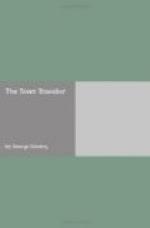“Better not,” replied the clear-headed man. “I wouldn’t if I were you.”
But his lordship insisted, looking reproachfully, and the brandy was produced. It did him good; that is to say, it brought colour to his face, and enabled him to sit upright. No sooner was he thus recovered than his eyes fell upon the envelope of a telegram which lay on his writing-table.
“There it is, at last!”
He tore the paper, all but sobbing with agony of impatience.
“Good God, I can’t see it! I’ve gone half blind all at once. Read it for me, Gammon.”
“Hope see you to-night. Important news. If not, in morning. —Greenacre.”
“Where did he send it from?”
“Euston, six o’clock.”
“Then he came by the Irish day-mail. Why didn’t I think of that and meet the train? What does he mean by to-night or to-morrow morning? What does he mean?”
“How can I tell?” replied Gammon. “Perhaps he has called here while you were away.”
Lord Polperro rang the bell, only to find that no one had asked for him. He was in a state of pitiable agitation, kept shuffling about the room with coughs and gasps, demanding ceaselessly why Greenacre left the hour of his appearance uncertain. Gammon, scarcely less excited in his own way, shouted assurances that the fellow might turn up at any moment. It was not yet ten o’clock. Why not sit down and wait quietly?
“I will,” said the other. “I will thank you, Gammon. I will sit down and wait. But I cannot conceive why he didn’t come straight here from Euston. I may as well tell you he has been to Ireland for me on business of the gravest importance. I am not impatient without cause. I trust Greenacre implicitly. He had a gentleman’s education. I am convinced he could not deceive me.”
More brandy helped him to surmount this crisis, then he was silent for a few minutes. Gammon thought he had begun to doze again, but of a sudden he spoke distinctly and earnestly.
“I am forgetting. You remember what I had decided to do. It shall be done at once, Gammon. I know it will relieve my mind.”
He rose, went to the writing-table, unlocked a drawer, and took out a large sealed envelope, on which something was written.
“Gammon, you are witness of what I now do. This is my will, executed about a year ago. I have reasons for wishing to dispose of my property in another way. Cuthbertson will see to that for me to-morrow. A will becomes public. I did not think of that at the time. There!”
He threw the sealed packet into the fire, where it was quickly caught by the flames and consumed.
“Now I feel easier in mind, much easier.”
He drank from the replenished glass, smiling and nodding.
CHAPTER XXII
NEW YEAR’S EVE
Gammon had the strangest sensation. He felt as though he were acting in a melodrama; he stood in a constrained position, as if the eyes of the house were upon him; he suffered from a sort of stage fright. Much more of this kind of thing would assuredly unsettle his wits. To recover tone he helped himself to a stiff glass of whisky.




